|
|
|
Sort Order |
|
|
|
Items / Page
|
|
|
|
|
|
|
| Srl | Item |
| 1 |
ID:
133732
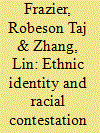

|
|
|
|
|
| Publication |
2014.
|
| Summary/Abstract |
This article examines Chinese cyberspace debates over the racial and national identity of a television show contestant Lou Jing, a biracial woman of Chinese and African American descent. We argue that the online commentary about her offers a productive entry point into contemporary Chinese cultural struggles over race. In particular, we consider how the Internet and other digital communication technologies are being mobilized as discursive sites for articulations of Chinese anti-black racism, as well as discursive sites of contestation, knowledge production, and cultural exchange regarding Chinese constructions of race and nationality.
|
|
|
|
|
|
|
|
|
|
|
|
|
|
|
|
| 2 |
ID:
133728
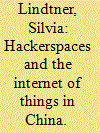

|
|
|
|
|
| Publication |
2014.
|
| Summary/Abstract |
This article discusses the visions and practices of DIY (do-it-yourself) maker culture in China. It analyses how the ideals held by DIY makers, such as openness, peer production, and individual empowerment, are formulated in relation to China's project of building a creative society and economy. To demonstrate, this article draws from long-term ethnographic research, including the setting up of China's first hackerspace, the proliferation of making, and partnerships between makers and manufacturers. China's makers are driven to reinvent what creativity, innovation, industrial production and citizenship mean today, simultaneously exploiting and challenging political rhetoric. By setting up hackerspaces, designing open technologies and starting up businesses, they craft alternative subject positions, for themselves and others. The contribution of this article is threefold. First, it fills a gap in current research by providing an account of a culture of technology production. Second, it proposes the analytical lens of 'making subjectivities' to open up the concept of the netizen, illustrating the importance for Chinese Internet research to consider not only technology use, but also the culture and materials of its production. Third, it demonstrates that maker culture is better understood as a parasitic culture rather than a counterculture, altering the system from within, contributing to our understanding of the relationship between technology use, production, society, activism and the state.
|
|
|
|
|
|
|
|
|
|
|
|
|
|
|
|
| 3 |
ID:
133731
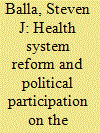

|
|
|
|
|
| Publication |
2014.
|
| Summary/Abstract |
Authoritarian regimes, such as the Chinese Communist Party (CCP), seek to bolster legitimacy by facilitating communications between citizens and government officials. This article investigates the operation of online consultation, a process through which citizens offer feedback on draft laws and regulations. The article specifically examines the importance of demographic characteristics and subjective motivations in the expression of citizen sentiments in response to a proposed revision to China's health system. By bringing together analysis of the content of citizen sentiment with a survey of participants, the article illuminates the determinants of the tone and substance of citizen feedback in health system reform. The primary finding is that participants who were internally efficacious and democratically oriented were, relative to respondents not possessing such traits, positive in tone and highly substantive in the submission of their comments concerning health system reform. This finding indicates that the health system reform commenting process offered citizens the opportunity to gain exposure to democratic principles and the process of articulating interests. More broadly, the analysis suggests the promise of online consultation in promoting citizen satisfaction with public policies, the legitimacy of the CCP, and, ultimately, stability in the Chinese political system.
|
|
|
|
|
|
|
|
|
|
|
|
|
|
|
|
| 4 |
ID:
133733
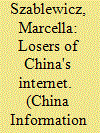

|
|
|
|
|
| Publication |
2014.
|
| Summary/Abstract |
Diaosi (??) ranked as one of the most popular Internet memes of 2012, and it continues to be popular to this day. This article analyses the origins and nature of the diaosi meme and the young men (and women) who self-mockingly describe themselves as 'losers'. The meme has led to ample speculation in the media and among Chinese academics, and while some see the meme as a relevant form of political critique, others dismiss it as indicative of a psychological malaise affecting contemporary youth. This article reviews the state of this debate about the meanings of the diaosi phenomenon, while offering a new interpretation that frames the meme in terms of Raymond Williams's notion of 'structures of feeling'. Though diaosi is a seemingly humorous and playful Internet meme, it is also one that signals young netizens' disillusionment with the apparent lack of possibilities for upward socio-economic mobility in contemporary China. This author contends that the diaosi phenomenon, though amorphous and at times contradictory, may also be considered an emergent form of affective identification through which alternative desires and forms of mobility may be imagined and enacted.
|
|
|
|
|
|
|
|
|
|
|
|
|
|
|
|
| 5 |
ID:
133730
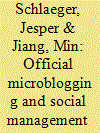

|
|
|
|
|
| Publication |
2014.
|
| Summary/Abstract |
How does the Chinese government's adoption of microblogs affect local governance and social contention it is tasked to manage? This case study explores the extent to which government microblogging could serve as: (1) a battering ram to spearhead reforms; (2) a virus bringing unexpected consequences; and (3) a reinforcer of authorities' existing power, that is, politics as usual. After studying a Chinese municipal government's microblogs (weibo ??) in depth from the perspective of local governance, we find that official microblogs do not in the short run lead to organizational change. Instead, Chinese local government microblogs function largely as 'beta-institutions' experimenting with ways to interact and negotiate with their microblog publics and microblog service providers and aimed at improving social management and political legitimacy. Local governments are also evolving gradually from service providers to 'service predictors' with enhanced capabilities to deliver individualized services and institute state surveillance via commercial service providers. These developments warrant further studies of the long-term implications of microblogs as part of the government information ecology.
|
|
|
|
|
|
|
|
|
|
|
|
|
|
|
|
| 6 |
ID:
133727
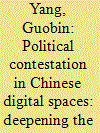

|
|
|
|
|
| Publication |
2014.
|
| Summary/Abstract |
Although research on the Chinese Internet is thriving, our understanding of its multidimensional character, its diverse forms, actors, and dynamics remains limited. This is due to a tendency to focus on technology at the expense of meaning and people, as well as a bias towards sweeping and dichotomous analytical categories, such as state vs. netizens, politics vs. entertainment, and authoritarianism vs. democracy. One of the perniciously appealing ways of sensationalizing the Chinese Internet falls under this either/or dichotomy. The seven contributions in this special issue of China Information challenge such binaries, thus deepening the critical inquiry into the multiple dimensions of the Chinese Internet. The authors show a more complex and nuanced picture of actors and contestation in Chinese digital spaces, as well as the symbolic forms and consequences of these contestations, illuminating new meanings of the political and new dimensions of digital contestation, including race, class and their interactions with the nation. Together, these articles exemplify an analytical orientation that I refer to as 'deep Internet studies'. They explore the Internet as a facet of a deep China by linking it to people's practical, perceptual, and moral experiences as well as to the contexts of institutions, politics, and policies.
|
|
|
|
|
|
|
|
|
|
|
|
|
|
|
|
| 7 |
ID:
133729
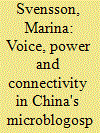

|
|
|
|
|
| Publication |
2014.
|
| Summary/Abstract |
This article addresses the issue of who has a voice on microblogs in China and what having a voice in the age of social media actually means. In theory, microblogs have a low threshold and are easy to use, thus enabling more Chinese citizens to articulate their concerns as well as paving the way for interactivity among different groups of people. In reality, however, not all citizens are as likely to use microblogs or be heard through them. Although microblogging practices have spread from the technology-savvy early adopters to broader groups in society, one should not assume that microblogs have helped bridge the information gap among China's ICT users, or empowered everybody in equal measure. This article discusses the demographics of microblog users, addressing diffusion patterns, number and range of followers, as well as topics discussed and how these are shaped by microbloggers of different socio-economic status. It makes use of and synthesizes existing surveys and previous studies in the field, while also building on this author's qualitative and ethnographic research on journalists and migrant workers. The article also addresses the 2013 crackdown on opinion leaders on microblogs and its implications for public debates and connectivity on social media.
|
|
|
|
|
|
|
|
|
|
|
|
|
|
|
|
| 8 |
ID:
133734
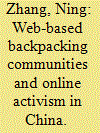

|
|
|
|
|
| Publication |
2014.
|
| Summary/Abstract |
This article examines activism that has emerged in online communities. This ethnographic study of two web-based backpacking communities shows that citizens and activists use the Internet mainly for forming communities, sharing information, instilling democratic values and solving immediate social problems. They do not call for cyberwar, acts of hacktivism or other sorts of offensive online and offline actions, but seek to bring social justice and improve well-being within their sphere of influence. The dynamics of this new online activism and its significance for the development of associational life and civil society in China are explored in this article.
|
|
|
|
|
|
|
|
|
|
|
|
|
|
|
|
|
|
|
|
|